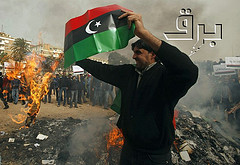Inside the Libyan Street
Jason Pack and Andrea Khalil in Monday’s Wall St. Journal. Written in Benghazi, Libya– September 11th now signifies a national tragedy not only for the United States but also for Libya. The killing of Ambassador Christopher Stevens in Benghazi during last Tuesday’s attack on the U.S. mission has upset the delicate political transition from dictatorship to democracy that was unfolding here in Libya. It also has obscured parliament’s prudent selection last Wednesday evening of Mustafa Abushagour—a moderate Islamist and respected technocrat—as prime minister. Yet spontaneous street demonstrations throughout the week denouncing the attack and seeking to pressure the government to act against its perpetrators suggest that Libyans are determined to build an inclusive society, free from fear. On Wednesday night …
ICC Captive Is Pawn in Struggle between Militias and the NTC
The key fault lines dividing the interim Libyan central government from both the militias and the international community are starkly illustrated in the ongoing saga surrounding the detention of four International Criminal Court (ICC) officials in Libya since June 7th. Among the detainees, Melinda Taylor has received the brunt of media attention, because she is a young and attractive Australian lawyer who was assigned by the ICC to represent the deposed dictator’s son, Saif al-Islam al-Qadhafi. She is currently being held captive by Zintani militiamen for ‘spying’. She allegedly possessed a digital pen camera and passed her client encrypted messages from Mohammad Ismael — a former crony of Saif’s, wanted for war crimes. It will likely be impossible for the …
‘Federalism’ in Libya: Already in the dustbin of History
In today’s Libya, local is king. Yet, if Libya is to become a functioning state governed by an elected leadership capable of empowering its citizens and providing an equitable distribution of its resource wealth, then, the interim government of the National Transitional Council (NTC) must become king. In the run-up to the June elections many militias and civil society organizations are lambasting the interim government’s mission to centralize authority rather than its lacklustre results at achieving that task. On March 5th, notables in Benghazi — Libya’s second city and capital of the Eastern region of Cyrenaica — proposed to compensate for the ineffectiveness of the central NTC authorities by asking them to relinquish certain powers to sub-state bodies such as …

Making Progress in Libya: NTC must exercise authority and tackle militias
The current situation in Libya can be best characterized as a struggle pitting the ‘centre’ that controls national institutions, the flow of oil, and billions in unfrozen assets against a marginalized ‘periphery’ that can challenge the centre’s legitimacy via its use of force and appeal to local loyalties. On February 17th, Libyans commemorated the one-year anniversary of their revolution against Muammar Qadhafi. Simultaneously, Amnesty International released a report accusing the victorious anti-Qadhafi militias of war crimes, widespread use of torture, and hindering the rebuilding of state institutions. The carnival-like atmosphere during the anniversary celebrations was marred by the palpable fear that the Libyan interim government — the National Transitional Council (NTC) — is failing to cement its authority. In the …
The U.S. Needs a Grand Strategy, Not Grandstanding
In the New Hampshire debate, Mitt Romney trumpeted his willingness to engage China in a trade war. Romney’s longstanding efforts to paint himself as someone willing to stand up to China exemplify an alarming trend of China-bashing in U.S. politics. Rick Santorum, among others, has echoed Romney, declaring, “I want to beat China.” Such statements are primarily targeted at shoring up political support and secondarily at painting President Obama as being soft on China. We should not take them as an accurate indication of future policy. And despite this overriding political calculus, these remarks are on to something – Beijing’s currency manipulation gives China a competitive advantage in global trade, and its abuse of intellectual property rights ought to be …










